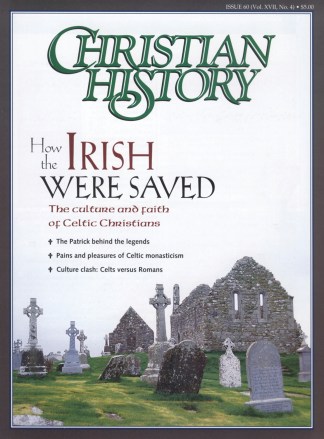Celtic Christianity seems archaic, a Christian tradition exiled to an obscure past, when druids and magicians roamed the green hills of Ireland. Spiritual nostalgia hypnotizes us with the fabled heroics of Patrick and Brigit, of Aidan and Hilda, among others. But that very nostalgia, even if celebrated in the spirit of an Irish wake, seems to signal that Celtic Christianity is dead and buried.
And yet it lives—not simply in the New Age mysticism that reaches back to Celtic paganism for inspiriation. An increasing number of Christians rooted in historic, orthodox Christianity are rediscovering the faith of the ancient Irish.
Take the Community of Aidan and Hilda, which recently started in the British Isles. These people describe themselves as “a body of Christians who wish to live wholeheartedly as disciples of Jesus Christ, and to express this in a way that draws inspiration from the lives of Aidan and other Celtic saints.” They don’t live together, but they do make common vows to live in simplicity (not necessarily poverty), chastity (that is, virtuously, whether single or married), and in obedience to God.
Their mission, they say, arises out of “a heart for the lost.” They want to evangelize our neo-pagan age just as the first Celtic missionaries did their pagan age: by first creating communities that “develop a disciplined spirituality that will make us effective in our witness to Christ in the world.”
Then there are all the environmentally concerned Christians, like myself, who find inspiration in Celtic prayers, which show a profound appreciation for creation without mistaking it for the Creator.
Others still find the study of Celtic Christianity historically fascinating. This branch of Christianity was not nurtured in a Roman or Byzantine environment but grew out of something complete different: Celtic culture and language.
There are some hurdles to studying Celtic Christians. Because of the many legends and fables that have sprouted up around Celtic saints, it’s often difficult to get at the core history. Protestants quarrel with a few Celtic practices, like the hyperdevotion to saints, and some wonder whether Celtic Christianity retained some measure of pagan superstition. Despite the difficulties, though, Celtic Christianity continues to fascinate and shape believers from all traditions.
In terms of what exactly was unique about Celtic Christianity, you’ll see different views expressed in this issue. Rather than edit unique views of diverse writers into a homogeneous whole, we let the diverse opinions stand.
Yet this is just another indication that Celtic Christianity is alive—as a subject of study, a topic of debate, and a Christian tradition that speaks to our times.
Copyright © 1998 by the author or Christianity Today/Christian History magazine. Click here for reprint information on Christian History.










